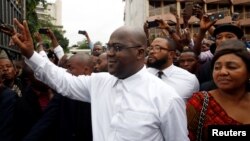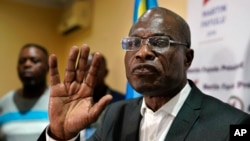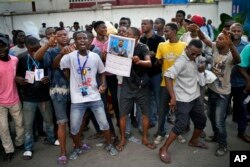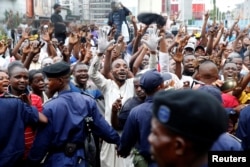The runner-up of the Democratic Republic of Congo’s presidential election is dismissing the official results showing Felix Tshisekedi winning the Dec. 30 vote as a sham.
The country’s election board, CENI, announced early Thursday that Tshisekedi won just more than 38 percent of the vote, surprising observers after pre-election polls projected that fellow opposition leader Martin Fayulu would win the vote.
Fayulu, who won 34 percent of the vote, accused the board of carrying out an “electoral coup,” and called on the Catholic Church to release the results of its independent vote tallying. Several diplomats have told news outlets that the votes counted by the church’s observation teams show Fayulu as the winner.
In Paris, Jean-Yves Le Drian, the French foreign minister told France's CNews channel Thursday that clarity in the election results is needed, saying the surprise victory of Tshisekedi was at odds with what was seen on the ground.
“We must have clarity on these results, which are the opposite to what we expected,” Le Drian said. “The Catholic Church of Congo did its tally and announced completely different results.”
The official results may fuel speculation that outgoing President Joseph Kabila made a deal with Tshisekedi to declare him the winner.
Emmanuel Ramazani Shadary, Kabila’s handpicked successor, finished a distant third.
If the results stand, it could lead to the country’s first democratic transfer of power since independence from Belgium in 1960. Stephane Dujarric, the spokesman for U.N. Secretary-General Antonio Guterres, commended the DRC for conducting an election that “saw a broad and inclusive participation of political parties.”
Dujarric said Secretary-General Guterres hoped that all institutions in the DRC “will live up to their responsibility in preserving stability and upholding democratic practices.”
Barnabe Kikaya Bin Karubi, one of Congolese Kabila’s top advisors, accepted the loss Thursday of the ruling party's preferred candidate.
“Of course we are not happy as our candidate lost, but the Congolese people have chosen and democracy has triumphed,” Kikaya told Reuters shortly after Tshisekedi was declared the winner.
If the results stand, it could lead to the country’s first democratic transfer of power since independence from Belgium in 1960.
Election challenges
The election in the DRC had been more than two years in the making. Postponed twice by the ruling coalition, the Common Front for the Congo, problems persisted even after a date was set. Nevertheless, the elections finally went ahead in late December.
Fayulu and ruling party candidate Shadary can contest the results before the country’s constitutional court, which has 10 days to hear and rule on any challenges.
Kabila is set to leave office this month after 18 years in power — and two years after the official end of his mandate. He backed Shadary, his former interior minister, in the election.
The Democratic Republic of Congo suffers from widespread corruption, continuing conflict, endemic disease, and some of the world’s highest levels of sexual violence and malnutrition. It is also rich in minerals, including those crucial to the world’s smartphones and electric cars.







